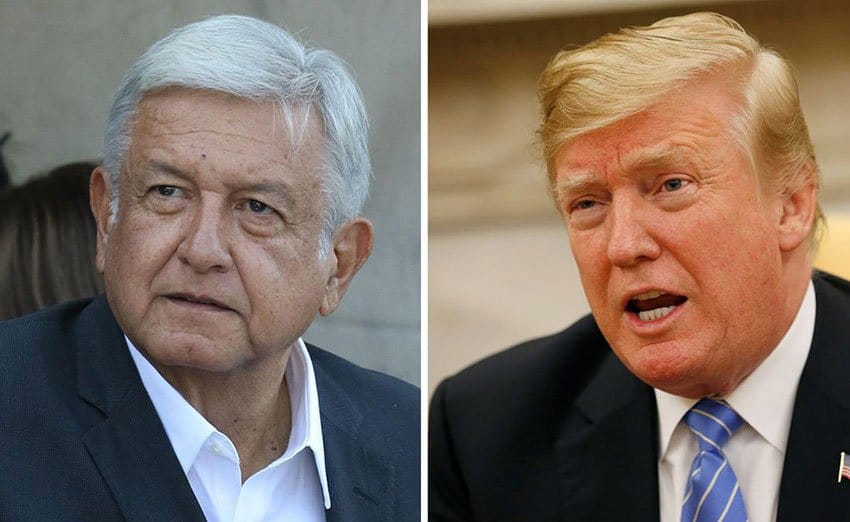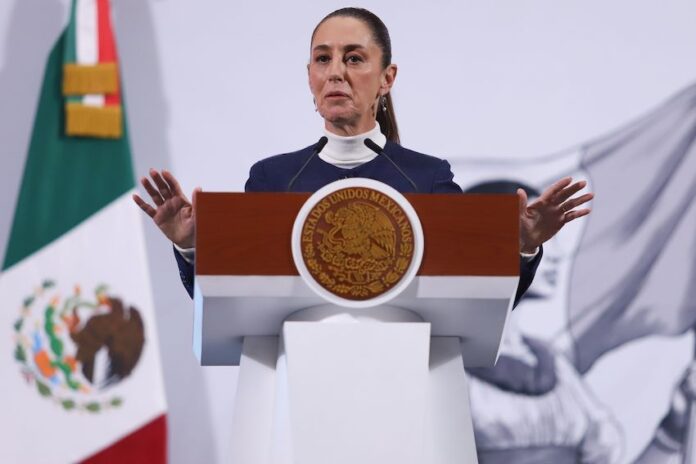The United States’ proposed 25% tariff on Mexican exports will be postponed for one month “as of now” thanks to a deal between the Mexican and U.S. governments, President Claudia Sheinbaum said Monday.
Sheinbaum said on social media that she had a “good conversation” with U.S. President Donald Trump on Monday morning and that “we reached a series of agreements” including one to postpone the 25% tariff, which was due to take effect on Tuesday.
Sostuvimos una buena conversación con el presidente Trump con mucho respeto a nuestra relación y la soberanía; llegamos a una serie de acuerdos:
1.México reforzará la frontera norte con 10 mil elementos de la Guardia Nacional de forma inmediata, para evitar el tráfico de drogas…
— Claudia Sheinbaum Pardo (@Claudiashein) February 3, 2025
She said that Mexico would “immediately” deploy 10,000 National Guard troops to the northern border “to avoid the trafficking of drugs from Mexico to the United States, in particular fentanyl.”
Sheinbaum also said that the United States had committed to “work to avoid the trafficking of high-powered weapons to Mexico” as part of the tariff deal.
“Our teams will begin to work today on two issues: security and trade. The tariffs are placed on pause for one month as of now,” she wrote.
For his part, Trump said on Truth Social that he had “a very friendly conversation” with Sheinbaum and that she “agreed to immediately supply 10,000 Mexican Soldiers on the Border separating Mexico and the United States.”
“These soldiers will be specifically designated to stop the flow of fentanyl, and illegal migrants into our Country,” he wrote.
“We further agreed to immediately pause the anticipated tariffs for a one month period during which we will have negotiations headed by Secretary of State Marco Rubio, Secretary of Treasury Scott Bessent, and Secretary of Commerce Howard Lutnick, and high-level Representatives of Mexico. I look forward to participating in those negotiations, with President Sheinbaum, as we attempt to achieve a ‘deal’ between our two Countries,” Trump said.

The agreement the Mexican and U.S. agreements reached on Monday is reminiscent of one negotiated during the first Trump administration when Andrés Manuel López Obrador was president of Mexico. In 2019, Trump threatened to impose a 5% tariff on all goods from Mexico to pressure the country to do more to stop immigration into the United States.
However, Mexico and the U.S. reached a deal in June 2019 that averted the proposed tariff. As a result of the agreement, Mexico beefed up security at both its southern and northern borders.
Trump said on Sunday night that he would speak to Canadian Prime Minister Justin Trudeau and “Mexico” on Monday morning, but added that he didn’t expect “anything dramatic” to come of the talks.
“We put tariffs on. They owe us a lot of money and I’m sure they’re going to pay,” said the United States president, who has railed against the trade deficits the U.S. has with its USMCA trade partners.
The U.S. and Canada reached a deal on Monday afternoon that paused Trump’s planned 25% tariff on Canadian exports for 30 days.
White House accuses Mexican government of providing ‘safe havens’ for cartels
In a “fact sheet” issued on Saturday, the White House said that Trump was responding to the “extraordinary threat posed by illegal aliens and drugs” by implementing tariffs on exports from Mexico, Canada and China.
The threat, the White House said, “constitutes a national emergency under the International Emergency Economic Powers Act.”
— Donald J. Trump (@realDonaldTrump) February 1, 2025
“Until the crisis is alleviated, President Donald J. Trump is implementing a 25% additional tariff on imports from Canada and Mexico and a 10% additional tariff on imports from China. Energy resources from Canada will have a lower 10% tariff,” the fact sheet said.
“President Trump is taking bold action to hold Mexico, Canada, and China accountable to their promises of halting illegal immigration and stopping poisonous fentanyl and other drugs from flowing into our country.”
The White House also said that “the Mexican drug trafficking organizations have an intolerable alliance with the government of Mexico.”
“The government of Mexico has afforded safe havens for the cartels to engage in the manufacturing and transportation of dangerous narcotics, which collectively have led to the overdose deaths of hundreds of thousands of American victims,” the White House said.
“This alliance endangers the national security of the United States, and we must eradicate the influence of these dangerous cartels,” the fact sheet said.
Given that Trump has laid the groundwork to designate Mexican drug cartels as foreign terrorist organizations, the assertion that the Mexican government “has afforded safe havens” for cartels is virtually akin to accusing Mexico of harboring terrorists.
Unsurprisingly, Sheinbaum rejected the White House’s claim.
Como decía Juárez: Nada por la fuerza; todo por la razón y el derecho. Entre los individuos, como entre las naciones, el respeto al derecho ajeno es la paz. Mensaje al pueblo de México: pic.twitter.com/yYUKmZsonY
— Claudia Sheinbaum Pardo (@Claudiashein) February 2, 2025
“We categorically reject the libel the White House makes against the government of Mexico,” she said in a social media post on Saturday.
Sheinbaum also said that the Mexican government is opposed to “any attempt at interference in our territory” — i.e. U.S. military action against Mexican cartels on Mexican soil.
In a lengthy social media statement, the president effectively accused U.S. gun stores of having an alliance with Mexican criminal groups because “they sell high-powered weapons” to them “as the United States Department of Justice showed in January of this year.”
Sheinbaum also highlighted the Mexican government’s efforts to combat drug trafficking.
“In four months our government has seized more than 40 tonnes of drugs, including 20 million doses of fentanyl,” she said.
“More than 10,000 people linked to these [criminal] groups have been detained,” Sheinbaum added.
She stressed that “Mexico doesn’t want confrontation” with the United States, and asserted that problems aren’t solved “with the imposition of tariffs” but rather through dialogue.
Sheinbaum said on Saturday that her administration would respond to the United States’ tariffs on Mexican exports with its “plan B,” which she explained “includes tariff and non-tariff measures in defense of the interests of Mexico.”
For now, those retaliatory measures will not be necessary given that Mexico and the United States — each other’s largest trade partners — have agreed to keep their hundreds of billions of dollars of annual trade tariff-free, at least for the next month.
Mexico News Daily
